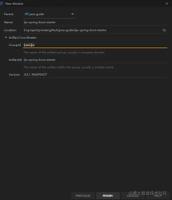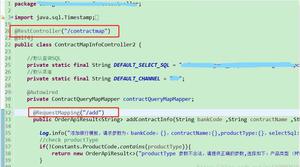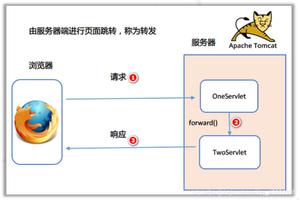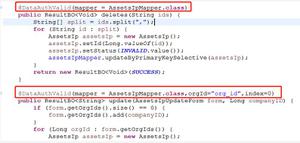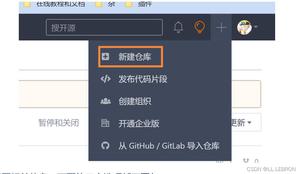springboot跨域问题解决方案
这篇文章主要介绍了springboot跨域问题解决方案,文中通过示例代码介绍的非常详细,对大家的学习或者工作具有一定的参考学习价值,需要的朋友可以参考下
springboot中的跨域问题,如果不注意的话,容易造成错误,本次springboot版本为2.13
前端错误信息:
Access to XMLHttpRequest at 'http://localhost:8080/user/loginOn' from origin 'http://localhost:8082' has been blocked by CORS policy:
Response to preflight request doesn't pass access control check: No 'Access-Control-Allow-Origin' header is present on the requested resource.
第一种:是在每个Controller里,加上注解:@CrossOrigin
import javax.validation.Valid;
@CrossOrigin
@RestController
@RequestMapping("/user")
public class UserController{
也可以在方法上加上,比如这样,这样针对具体的方法
@CrossOrigin
@ApiOperation(value = "用户登录",notes = "")
@PostMapping("/loginOn")
public ResponseMessage loginOn(@RequestBody @Valid UserReq userReq){
每一个Controller这样写也是很麻烦。
第二种:是实现WebMvcConfigurer接口,在接口中进行跨域支持
以前可以继承WebMvcConfigurerAdapter,springboot2.x版本已经将其@Deprecated
我们直接实现接口:
@Configuration
public class WebConfig implements WebMvcConfigurer {
/**
* 跨域支持
* @param registry
*/
@Override
public void addCorsMappings(CorsRegistry registry) {
registry.addMapping("/**")
.allowedOrigins("*")
.allowCredentials(true)
.allowedMethods("GET", "POST", "DELETE", "PUT")
.maxAge(3600 * 24);
}
但使用这种方法,我今天遇到一个坑,我准备在拦截器里面对用户的请求进行拦截
@Component
public class RequestInterceptor implements HandlerInterceptor {
@Override
public boolean preHandle(HttpServletRequest request, HttpServletResponse response, Object handler) throws Exception {
Object loginUser = request.getSession().getAttribute("token");
if(loginUser == null){
//自定义的异常类,这里抛出异常,交给全局异常捕捉类处理
throw new ServiceException("没有权限,请先登录!");
}else{
return true;
}
}
@Override
public void postHandle(HttpServletRequest request, HttpServletResponse response, Object handler, ModelAndView modelAndView) throws Exception {
}
@Override
public void afterCompletion(HttpServletRequest request, HttpServletResponse response, Object handler, Exception ex) throws Exception {
}
}
全局异常捕捉类:
@RestControllerAdvice
public class GlobleExceptionHandler {
@ExceptionHandler(value = ServiceException.class)
public ResponseMessage caughtException(ServiceException e){
return new ResponseMessage(e.getMsg());
}
}
ResponseMessage 是自定义的统一的响应信息类:
ResponseMessage
@Data
public class ResponseMessage {
private Integer Code;
private String msg;
private Integer count;
private Object data;
public ResponseMessage(Object data) {
this.data = data;
}
public ResponseMessage(String msg) {
this.msg = msg;
}
public ResponseMessage(Integer code, String msg) {
Code = code;
this.msg = msg;
}
public ResponseMessage(Integer code, String msg, Integer count) {
Code = code;
this.msg = msg;
this.count = count;
}
public ResponseMessage(Integer code, String msg, Integer count, Object data) {
Code = code;
this.msg = msg;
this.count = count;
this.data = data;
}
public static ResponseMessage success(String msg){
return new ResponseMessage(200,msg);
}
public static ResponseMessage fail(Integer code,String msg){
return new ResponseMessage(code,msg);
}
}
通过这样的处理发现,前端一直报跨域异常问题,这时候有了第三种方法
第三种:使用CorsFilter过滤器:
写一个MyCorsConfig 配置类
@Configuration
public class MyCorsConfig {
@Bean
public CorsFilter corsFilter() {
CorsConfiguration corsConfiguration = new CorsConfiguration();
corsConfiguration.addAllowedOrigin("*");
corsConfiguration.addAllowedHeader("*");
corsConfiguration.addAllowedMethod("*");
corsConfiguration.setAllowCredentials(true);
corsConfiguration.setMaxAge(3600L);
UrlBasedCorsConfigurationSource source = new UrlBasedCorsConfigurationSource();
source.registerCorsConfiguration("/**", corsConfiguration);
FilterRegistrationBean bean = new FilterRegistrationBean(new CorsFilter(source));
//设置过滤器的顺序
bean.setOrder(0);
return new CorsFilter(source);
}
}
最终解决本次demo的跨域问题。
以上是 springboot跨域问题解决方案 的全部内容, 来源链接: utcz.com/z/328202.html



